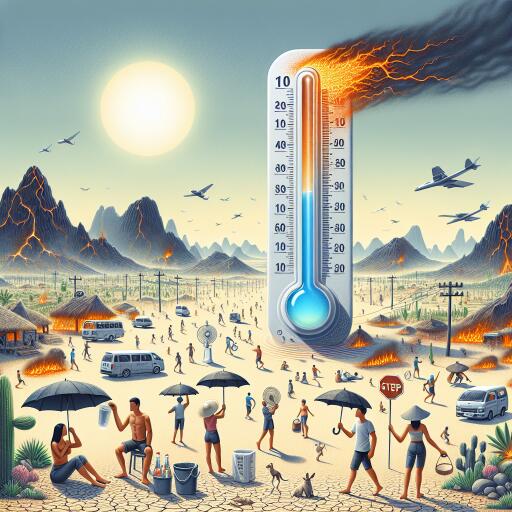
Heatwave Hits Vietnam Hard, Shattering Over 100 Temperature Records
In an unprecedented climatic event, Vietnam experienced an extraordinary number of weather extremities in April when it suffered through an intense heatwave. This heatwave not only shattered more than 100 temperature records but also highlighted the increasing threat of climate change combined with the El Nino phenomenon. The catastrophic temperatures swept across South and Southeast Asia, leading to fatalities due to heatstroke, widespread school shutdowns, and severe drought conditions.
April’s scorching conditions saw Vietnam go through three severe heatwaves, with temperatures reaching alarming highs. The peak was observed at an astonishing 44 degrees Celsius (111.2 Fahrenheit) in two towns, narrowly missing the highest temperature ever recorded in the country by a slim margin. This climatic fury saw a total of 102 weather stations across Vietnam reporting the highest temperatures ever for April. Particularly hard hit were the northern and central regions, where the mercury soared 2-4 degrees Celsius above last year’s records.
The ramifications of such extreme heat were visibly stark, especially in the southern province of Dong Nai, where a tragic mass die-off of fish occurred in the Song May reservoir. This environmental disaster, attributed to the combined effects of the heatwave-induced water shortage and mismanagement, painted a grim picture of the ecological impact of such temperature spikes.
Despite the onset of what is typically the hottest season in Southeast Asia, the intensity of this year’s heat has been significantly magnified by the El Nino effect. This phenomenon, characterized by the warming of ocean surface temperatures in the central and eastern Pacific, has exacerbated the climatic conditions across the region. The Vietnamese meteorological agency forecasts that the trend of higher-than-usual temperatures will continue into May, expecting them to be 1.5 to 2.5 degrees higher than in previous years.
The fallout from the heatwave has been felt across the region, with neighboring countries also recording broken temperature highs and suffering from its dire impacts. From Bangladesh and Myanmar experiencing unprecedented April highs to Thailand reporting significant heatstroke fatalities since the year began. The heat has been so severe that the Philippines has seen Roman Catholic bishops calling for prayers for rain and cooler weather as tens of thousands of schools were forced to close. Kolkata, India, bore the brunt of the heat as well, recording its hottest April day since 1954, with temperatures peaking at 43 degrees Celsius.
Nepal, despite its mountainous terrain, has not been spared, with the government issuing health warnings and firefighters tackling severe wildfires, a rare occurrence for the country. Across the region, the impact of the heatwave has brought to the forefront the urgent need for climate action and better management of resources to mitigate the effects of such extreme weather events, unpredictable and devastating as they might be.
As temperatures continue to rise and the climate crisis deepens, these events serve as a stern reminder of the pressing need to address human-induced climate change. The patterns observed signify a shift towards more frequent, longer, and more intense heatwaves, underscoring the necessity for immediate and concerted action globally to combat this existential threat.





Leave a Reply